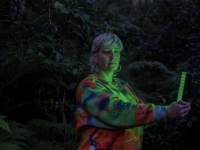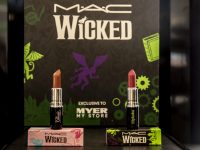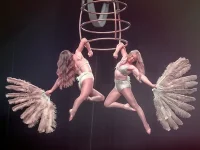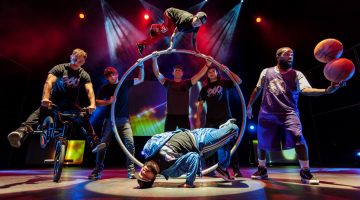 Part 2 – DIRTY DANCING interview with Stars Kurt Phelan and Kirby Burgess
Part 2 – DIRTY DANCING interview with Stars Kurt Phelan and Kirby Burgess
Australian audiences are loving current previews of the Australian production of Dirty Dancing, which will play at the Sydney Lyric Theatre from 28 November this year, followed by Melbourne’s Princess Theatre from 4 March 2015 and the Lyric Theatre, QPAC from 27 May.
Two extraordinary young talents will make the leap from chorus to leading roles as the two iconic characters in this much loved musical production. The role of charismatic dance teacher Johnny Castle will be played by Kurt Phelan while the role of innocent young “Baby” Houseman will be played by Kirby Burgess. A NIDA graduate, Phelan is an actor, choreographer and writer. His musical theatre credits include Singin’ in the Rain, Witches of Eastwick, Saturday Night Fever and Priscilla Queen of the Desert. Burgess has been seen on stage in Sweet Charity, An Officer and A Gentleman, Hairspray, High School Musical – Live on Stage and currently in LOVEBiTES, and on television in Wonderland. A few weeks ago DanceLife had to opportunity to watch a rehearsal for the show as well as interview both Kurt and Kirby. Here in Part 2 of our 3-part interview with the pair they talk about their characters and what it’s like to be a part of such an iconic show:
Can you tell us a little bit about your characters?
Kirby: I’m playing Baby and she is pretty much exactly the same as the film but a little younger, she’s played around 16-17 years old, whereas I feel that Jennifer Grey played her around the 20-21 age mark, so you get more of an innocence out of the stage version of Baby. She’s very smart; she’s a book-worm! She loves being an intellect and she relishes in that. Johnny and this world that she discovers is told so beautifully through dance and being taught how to dance – that blossoming of love! It’s a really different story because you can’t say that the wrong side of the tracks tempts her because it’s not that. She’s enchanted by this world that she never knew existed – it’s this discovery for her. So when she walks into the staff quarters and sees them dancing like they do, nobody touched each other like that back then, at least not anybody she knew because she is from a privileged background
Kurt: And that’s why it’s hard for her to understand that the characters of Johnny and Penny are just friends.
Kirby: So she has this beautiful story in the show, which is told through dance. She discovers herself, discovers that it’s ok to not do what other people just want you to do and falls in love for the first time. She’s a really cute character but with guts! That’s great in the scenes that Baby and Johnny get to do together because you think she’s all sweet and innocent yet she fires back and I think that’s when Johnny starts to think “ there’s something I feel about this girl”.
Kurt: And I’m playing Johnny. You might say he’s the guy from the wrong side of the tracks but it’s a lot deeper than that. He’s come from a place where he’s learnt that money gives you power, which he’s a bit trodden down by that and the only escape he has from it is dance. Which I think that Eleanor Bergstein inherently wrote in the role but being a guy growing up dancing, it’s exactly how you feel – you do feel alone and it’s an escape. But he’s described in the script as prince of the streets so he’s got evident quality about him, because he has a bit of poise, but he’s fighting it so he can be accepted. If he potentially didn’t have to go home from the camp when it wasn’t summer he would probably live his life at Kellerman’s (a summer holiday resort) and be a very dapper guy. But he goes home to his family who don’t have money and are struggling so that effect his character.
 Kirby: What’s funny about dancing for Johnny is that it’s his good and bad because it’s his escape but it’s also the reason why Johnny has so much experience with the ladies. I mean, Baby asks him how many women he’s been with which is something you do and think about when you first get in a relationship with someone but you don’t really want to know the answer. But he knows these women are just putting money in his pocket and it’s this evil side I guess because he is such a good dancer that it has led him to this evil side.
Kirby: What’s funny about dancing for Johnny is that it’s his good and bad because it’s his escape but it’s also the reason why Johnny has so much experience with the ladies. I mean, Baby asks him how many women he’s been with which is something you do and think about when you first get in a relationship with someone but you don’t really want to know the answer. But he knows these women are just putting money in his pocket and it’s this evil side I guess because he is such a good dancer that it has led him to this evil side.
Kurt: Yeah, there’s passion in dance, the perfect example of that is sometimes people take that as attraction but it has nothing to do with it. Just because 2 bodies are moving in the same way in time, it doesn’t mean it’s passionate. And the main difference between the stage and film versions of these characters is that there’s time to get to know them. The show has a lot of scene’s and especially Act 2, it’s mostly acting.
Which must be so refreshing for the both of you …
Kurt: So refreshing! And there’s the cool cute dancing scene’s as well when I’m teaching the women and “Lover Boy” which everybody just loves! Eleanor re-realised these characters and still writes fresh drafts of the script, doing adaptations and constantly working on it which is great!
Kirby: It’s always evolving and it makes it special for us because we are doing a different show to every other cast that’s done around the world because we’ve got different scenes and the set is constantly changing to keep it fresh.
Kurt: And it’s not like other shows. I’ve done a lot of shows from different shows from other countries and they arrive and you turn on the left because that’s what the guy that did it 20 years ago turned on the left, doesn’t matter if you’re better on the right, but that’s just what you do. But this show is all about the individual, so it’s like “you’re stronger on the right, so let’s do your presses on the right”.
Kirby: And Michele Lynch, our choreographer, has choreographed all of the pieces, except for the really famous moves like the final number, so that everyone gets their own moves into it.
So people who saw it when it first came out in Australia aren’t seeing the exact same show?
Kurt: That’s right, it gives you ownership to it – which is so important as a performer.
Kirby: And to work with strengths of what you have in front of you.
Kurt: They were saying to me on day 1 that it was really nice to have a Johnny who is quite light and fun. Usually the Johnny’s are quite dark and serious and they have the get the lighter side out of them in rehearsal so it will be easy to make you dark at the beginning.
Do you find that with this process it’s easier to make the roles your own?
Kurt: It definitely does and the choreography being tailored to us also really helps. Like the guy Michele last choreographed as Johnny was an ex ballet boy who had ballroom background so none of the jazz stuff with the isolations worked for him so they took them out and now with me she’s like “you’re a jazz dancer! I can put all of the pops back in!” and they’re a little more Swayze-esque because he wasn’t ballet trained. He was a little more raw, because he’s just a bloke.
Kirby: There’s a beautiful interview with him (Patrick Swayze) when they were putting the film together because they just thought they were making this art house, left of centre movie. They had no idea it was going to become the phenomenon it is. And he is saying that he loves dancers as actors because we’re so raw. We’re used to being mashed together and being one as a group. He’s saying that dancers have this ability to express themselves without saying words and that’s what we’re taught to do and that’s why he loves acting with dancers and being a dancer. He was trained but he’s not a ballet boy but he’s so passionate about it that he used that in all his films. If you watch him in ghost, he’s so physical.
Kurt: I spent three years at NIDA being taught how to stand still. You know, hands by your sides. I had this teacher that used to put an elastic band attached to my hand because I would always gesture while I was rehearsing as a reminder that you don’t always have to gesture. And because I had three years of standing still, in the last play they were like great, now we want you to play this role that’s very physical and I brought the stillness that I had learnt back to my physicality. I was so glad they did that , at the time I hated them for it but I really am happy they pushed me to do that because I now feel comfortable being still and there’s power in that.
Kirby: In this kind of show as well, because everyone is partnered pretty much the whole time, Michele said to us this morning in rehearsals just be dirty, allow yourself to go there and I think with this generation of dancers coming through with hip hop and twerking we’re losing that story telling. We’re getting this sense of “hip hop” face but it shouldn’t be that way. It’s either those angry faces, sexy faces or competition dancers who are all about tricks.
Kurt: Yeah tricks – what is that?!? I didn’t know how to do that stuff as a kid! When I teach kids some of the stuff they do I’m like “are you joking?! Do that again!” (haha)
Kirby: And I love it when a show newbie comes in because you can tell when it’s their first show because when people ask can you do tricks their hand goes straight up but after 2 or 3 shows you don’t want to do them anymore (haha)
Kurt: That happened in this show, when they asked who could do tricks all the boys looked away and went silent. And then Amy Campbell (the dance captain) said Charlie can and he just groaned (hahaha)
Kirby: But to come back to the story telling (haha), you’re not trying to be sexy to turn someone on, you’re being sexy because you’re so entranced with someone else and I think we’re kind of losing that in this generation. So it’s nice to come back to that and realise it’s so much hotter that way.
Kurt: It’s style as well. You know what I mean.
Kirby: Definitely! I mean you see guys like the Square Division getting so much more theatrical with their work now. They’re using faces for choreography as a form of expression and it’s just amazing. We’ve got some great Australian choreographers who are really setting the bar.
Kurt: The thing is as well – it’s about style. I learnt basically technique because I’m from the country and that’s what most dance schools do out there. Then I came to the city and I knew from there, that’s when I was learning how to dance.
Dirty Dancing opens on November 28th at the Sydney Lyric.
Tickets are available through Ticketmaster













